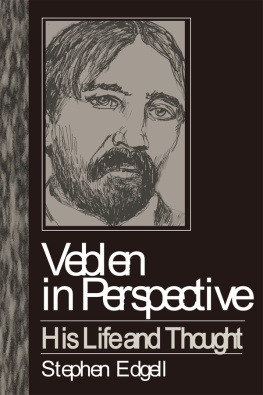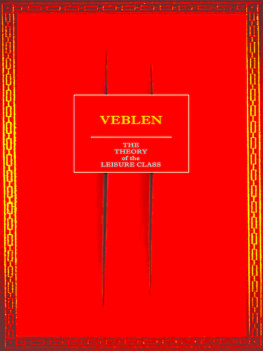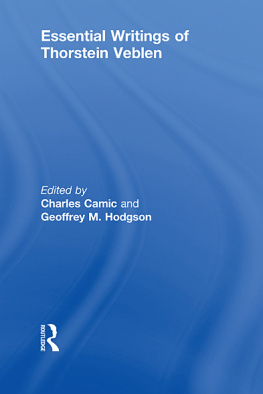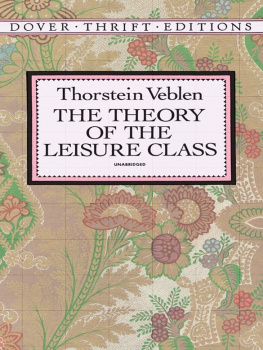____________________
| 
|
____________________
|
STUDIES IN INSTITUTIONAL ECONOMICS
GARDINER C. MEANS
INSTITUTIONALIST AND POST KEYNESIAN
Warren J. Samuels and Steven G. Medema
THE HETERODOX ECONOMICS OF GARDINER C. MEANS
A COLLECTION
Frederic S. Lee and Warren J. Samuels, editors
UNDERGROUND ECONOMICS
A DECADE OF INSTITUTIONALIST DISSENT
William M. Dugger
THE STRATIFIED STATE
RADICAL INSTITUTIONALIST THEORIES OF PARTICIPATION AND DUALITY
William M. Dugger and William T. Waller, Jr., editors
A VEBLEN TREASURY
FROM LEISURE CLASS TO WAR,PRICE, AND CAPITALISM
Rick Tlman, editor
ACTIVIST UNIONISM
THE INSTITUTIONAL ECONOMICS OF SOLOMON BARKIN
Donald R. Stabile
BEYOND DISSENT
ESSAYS IN INSTITUTIONAL ECONOMICS
Philip A. Klein
THE UNITED NATIONS AT THE CROSSROADS OF REFORM
Wendell Gordon
A MONETARY THEORY OF EMPLOYMENT
Gardiner C. Means
Warren J. Samuels and Frederic S. Lee, editors
VEBLEN IN PERSPECTIVE
HIS LIFE AND THOUGHT
Stephen Edgell
First published 2001 by M.E. Sharpe
Published 2015 by Routledge
2 Park Square, Milton Park, Abingdon, Oxon OX14 4RN
711 Third Avenue, New York, NY, 10017, USA
Routledge is an imprint of the Taylor & Francis Group, an informa business
Copyright 2001, Taylor & Francis. All rights reserved.
No part of this book may be reprinted or reproduced or utilised in any form or by any electronic, mechanical, or other means, now known or hereafter invented, including photocopying and recording, or in any information storage or retrieval system, without permission in writing from the publishers.
Notices
No responsibility is assumed by the publisher for any injury and/or damage to persons or property as a matter of products liability, negligence or otherwise, or from any use of operation of any methods, products, instructions or ideas contained in the material herein.
Practitioners and researchers must always rely on their own experience and knowledge in evaluating and using any information, methods, compounds, or experiments described herein. In using such information or methods they should be mindful of their own safety and the safety of others, including parties for whom they have a professional responsibility.
Product or corporate names may be trademarks or registered trademarks, and are used only for identification and explanation without intent to infringe.
The author is pleased to acknowledge permission to use materials from the following sources: Material in chapters 2 and 3 were taken from "Rescuing Vehlen from Valhalla: Deconstruction and Reconstruction of a Sociological Legend" by Stephen Edgell, British Journal of Sociology 47: 627-42; the Web site for which is http://www.tandf.co.uk/journals. Reprinted by kind permission of Taylor & Francis Ltd., RO. Box 25, Abingdon, Oxfordshire, OX14 3UE, England. From the papers in the Thorstein Vehlen Collections, Carleton College Archives (CCA), Northfield, Minnesota. From the papers in the Joseph Dorfman Papers, Rare Book and Manuscript Library, Columbia University, New York (referred to as CUL), and from the papers in the David Starr Jordan Papers, Stanford University Archives, Stanford University, Stanford, California (referred to as SUL).
Library of Congress Cataloging-in-Publication Data
Edgell, Stephen
Veblen in perspective : his life and thought / Stephen Edgell.
p. cm. (Studies in institutional economics)
Includes bibliographical references and index.
ISBN 1-56324-116-1 (alk. paper)ISBN 1-56324-117-X (pbk : alk. paper)
1. Veblen, Thorstein, 18571929. 2. EconomistsUnited StatesBiography.
3. Institutional economics. I. Title. II. Series.
HB 119.V4 E34 2001
330.092dc21
[B] | ISBN 13: 9781563241178 (pbk) | 00-068767 |
ISBN 13: 9781563241161 (hbk) |
The opportunity to satisfy my curiosity about this imperspicuous sociologist presented itself when I decided to take a break from empirical research and spent the 1973 summer vacation ensconced in Manchester Central Public Library with the writings of Thorstein Veblen. Reading the bulk of Veblens intellectual output at one sitting, as it were, revealed that his social scientific contribution was characterized by a theoretical coherence that the vast majority of scholars had either underrated or failed to recognize. This prompted me to write an article which sought to make good this gap in the literature (Edgell 1975). Specifically, I argued that Veblens often-maligned general theory of evolutionary change was the integrating dimension of his sociological project, one that focused on a macroeconomic and sociological account of American capitalism.
After returning to and completing my empirical social research on middle-class couples (Edgell 1980), I started to teach a Masters-level course on Veblen. At this stage in my career I was distracted initially by serious ill health and then by Thatcherism (Edgell and Duke 1991). In between collecting and reporting on a longitudinal survey research into the social and political effects of Thatcherism, I took some more time out from the rigors of field work to write a bibliographical essay on Veblen (Edgell 1987). This overview of Veblens sociological contribution was intended as a guide to both the original and the secondary literature on Veblen. That I found this exercise instructive is reflected in the material for this book, although specific points of interpretation and the general compass of the content are markedly different. Since the end of Thatcher and the completion of my work on Thatcherism, aside from writing a short textbook on class with special reference to Britain and America (Edgell 1993) and coediting a couple of monographs of relevance to certain Veblenian concerns, namely the decline of the public sphere (Edgell et al. 1995), and the sociology and anthropology of consumption (Edgell et al. 1996), I have concentrated on the writings of Veblen and interpretations of them. This has involved writing, presenting, and publishing, as sole and joint author, a range of papers on various aspects of Veblens work. In the process I became aware that often I was the only Veblen buff from Britain who was engaged in a regular way with the latest Veblen scholarship and that my perspective on Veblen was different from the perspectives of my American colleagues. For instance, I filtered Veblen through the lenses of my greater familiarity with British and European, compared with American, history, thinkers and ideas, whereas the opposite was the case generally for American Veblenians.









